Adams House (Harvard College)
Adams House is one of twelve undergraduate residential Houses at Harvard University, located between Harvard Square and the Charles River in Cambridge, Massachusetts. Its name commemorates the services of the Adams family, including John Adams, the second president of the United States, and John Quincy Adams, the sixth president.
| Adams House | |
|---|---|
| Residential House | |
| Harvard University | |
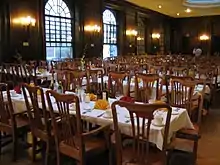 The Adams House dining hall | |
| Location | 26 Plympton Street |
| Coordinates | 42°22′18″N 71°06′59″W |
| Established | 1931 |
| Named for | John Quincy Adams and the Adams family |
| Sister college | Saybrook College Christ's College, Cambridge |
| Freshman dorm | Weld Hall |
| Faculty Deans | Judy and Sean Palfrey |
| Dean | Charles Lockwood |
| HoCo chairs | Tiffany Gonzalez and Minjue Wu |
| Tutors | 27 |
| Website | adamshouse |
History
The residential halls of Adams House (Claverly, Randolph, Westmorly and Old Russell) were originally private "Gold Coast" dormitories built from 1893–1902 to provide luxurious accommodation for rich Harvard undergraduates. They, along with the white clapboarded Apthorp House (1760), one of the most distinguished Colonial residences of Cambridge—and now the faculty deans' residence—predate the rest of Harvard's Houses by several decades.[1] When the House system was inaugurated in the 1930s, Old Russell was demolished and replaced with New Russell (which houses the C-Entryway suites). A linking structure was also added that contains the upper and lower common rooms, library, conservatory, kitchen, and dining areas; the addition also includes the famous "Gold Room" — Adams' domed, tiled and gilded Mudéjar-inspired entrance hall. Although officially inaugurated in 1931, Adams was not completed until 1932. Because of its centuries-long architectural history, Adams is considered Harvard's most historic undergraduate residence.
Surprisingly, given the House's current appeal, Adams was not popular initially; the Victorian era rooms of the Gold Coast buildings seemed dark and "Germanic" to 1930's taste, and many students preferred the entirely up-to-date neo-Colonial structures of Eliot, Winthrop and Dunster Houses.[2] Adams' location, however, (it is the closest of all the Houses to Harvard Yard) and its reputation for good food (it is one of the few Harvard Houses that doesn't share a kitchen) soon overcame any perceived architectural deficiencies. In fact, some of these same “deficiencies” turned out to be quite handy: students in the 1940s and 1950s wishing to avoid the College's strict nightly curfews and parietal rules came to greatly value Adams' multiple and unguarded entries, unlike the central, monitored portals of the newer undergraduate residences. Today, of course, such stringent measures are long gone, and the various buildings that comprise Adams House are considered some of the most interesting and architecturally significant structures in the University system.
Adams is also home to one of two Presidential Suite Memorials at Harvard. Franklin D. Roosevelt lived in Westmorly Court (now B-17) from 1900 to 1904. The Franklin Delano Roosevelt Foundation at Adams House has completely restored the 32nd president's Harvard quarters to their 1904 appearance, as the only memorial to FDR at Harvard, as well as a museum of early-20th-century Harvard student life. The Suite is open by appointment to University members, members of the press, and other accredited guests.[3]
Emblem and motto
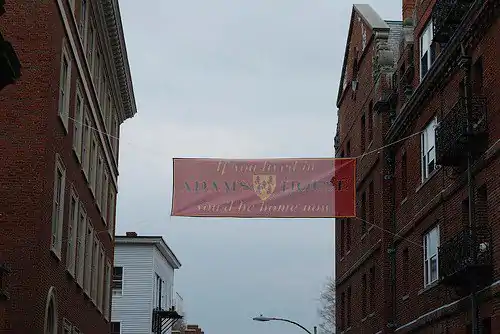
Like all the other Houses at Harvard, Adams possesses its own coat of arms: Adams' is derived from an 1838 seal ring of John Quincy Adams. James Phinney Baxter, the House's first master, changed the background to gold to symbolize the Gold Coast, and added four additional oak sprigs to the original one to represent the five buildings of Adams House. Its official heraldic designation is: "Or, five sprigs of oak acorned in saltire, Gules." The House motto, "Alteri Seculo," is taken from Caecilius Statius, as quoted in Cicero's Tusculan Disputations: "He who plants trees labors for the benefit of future generations." ("Serit arbores quae alteri s[a]eculo prosint.")[4] (The alternate, late-Latin spelling, 'seculo' in lieu of the more normal 'saeculo' was noted at the House's founding in 1932. A letter to Master Baxter, now in the Adams House Archives, indicates that Adams himself had thus spelled the word in his signet, and therefore this spelling would be maintained for posterity in the House's official motto.)
Reputation and traditions
Before Harvard College opted to use a system of randomization to assign living quarters to upperclassmen, students were allowed to list housing preferences, which led to the congregation of like-minded individuals at various Houses. At first, in the 1930s, 1940s and 1950s, Adams was the athletic house; then, during the late 1960s, that reputation changed, and Adams became a center for student activism. Later, under the aegis of Masters Bob and Jana Kiely (1972–1999) Adams became an artistic and literary haven; during this period, Adams also became widely regarded as the most gay-friendly house, in an era before equal rights for people of different sexual orientations were even considered a viable alternative at Harvard. Adams, under the Kielys, was also the first Harvard House to become fully co-ed.[5] Vestiges of that avant-garde reputation still remain today, protected and promoted by the House's current masters, Judy and Sean Palfrey, and embodied in many of the House's unique facilities, including the Pool Theater, a converted swimming pool (a change lamented by alumni mourning the many late night trysts, water polo matches and other quasi illicit activities that were reputed to have occurred there, like coed nude swimming); the recently restored Coolidge Room (the site of artist Edward Penfield's famous murals) and the Gold Room, Adams' gilded vestibule to the world. Adams also boasts the Bow and Arrow Printing Press which is located in the former house grill in B entry, and the Adams Arts Space (previously the House's squash courts).
The House has continued to uphold its most beloved traditions, including Halloween's Drag Night and Masquerade; a Winter Feast, which features a black-tie reading of Winnie-the-Pooh; house formals; and Masters' Teas that are well known throughout the University. House events, including Carpe Noctem, are coordinated weekly by the Adams House Committee.
The current faculty deans of Adams House are Dr. Judith Palfrey and her husband Dr. John "Sean" Gorham Palfrey VI. They frequently host tea in Apthorp House for undergraduates, and open their house on the Sunday evenings between Thanksgiving and spring break for students to work.
Alumni magazine
Alone among the Harvard Houses, Adams has its own alumni magazine, called the Gold Coaster. Published in e-zine format semi-annually, the Gold Coaster features stories on Adams House history, famous residents, alumni profiles, student submissions, and news of upcoming alumni events.
Notable residents
Other notable residents include John Brademas, Amy Brenneman, Thomas Lauderdale, Martin Feldstein, Lauren Greenfield, Andre Gregory, Alan Keyes, Bernard Law, Robert Leiken, Donal Logue, Lance Oppenheim, William P. Perry, Alison Rogers, Peter Sellars, Courtney B. Vance, Zaid Al-Rifai, Richard Drayton, William S. Burroughs, Jack Lemmon, Michael Weishan, Claire Saffitz, and John Kerr.
General John Burgoyne was imprisoned in Apthorp during the American Revolution. Additionally, John F. Kennedy (political rival to aforementioned Henry Cabot Lodge, Jr.) met with his senior thesis adviser in the Coolidge Room. Aaron Copland lived in the House as a guest.
In fiction
In the 1981 novel Death in a Tenured Position by Amanda Cross, the book's detective Kate Fansler attends a paper on Browning's Fra Lippo Lippi (poem) read at a meeting of the Harvard Iambics in the Adams House SCR to attempt to discover 'the state of the English department' after the murder of one of its number.
Further reading
- Bainbridge Bunting, Margaret Henderson Floyd, Harvard: An Architectural History, Harvard University Press, 1985.
- Shand-Tucci, Douglass, Harvard University: An Architectural Tour, Princeton Architectural Press, 2001
- Roosevelt, Franklin D.; Roosevelt, Elliot, ed. FDR: His Personal Letters (4 vol., 1947); volume one covers Roosevelt's years at Groton and Harvard; pg 371 gives a physical description of FDR's Suite at Adams House, and includes Roosevelt's own drawing of the floor plan; subsequent letters describe the rooms' decor and furnishing.
Notes
- Garrett, Wendell D. (1960). Apthorp House, 1760-1960. Harvard University Press. ISBN 978-1258189914.
- Shand-Tucci, Douglas (2001). Harvard University, an Architectural Tour. Princeton Architectural Press. ISBN 978-1568982809.
- "Photographic views of Adams House, 1931-1961". Harvard University Archives. Retrieved 16 June 2016.
- L.H. Butterfield and M. Friedlaender. Adams Family Correspondence, Volume 1. Harvard University Press, 1963. Accessed via Google Play Store, December 3, 2018. Page vi. https://books.google.com/books?id=v4IBYF8zE9IC&pg=PR6&lpg=PR6&dq=alteri+seculo+Caecilius+Statius&source=bl&ots=Cv5NPwkT9F&sig=re9S9dGx-f5KVu6tbbHiKAGYd1U&hl=en&sa=X&ved=2ahUKEwiV54eervbeAhWGZd8KHRsBBIIQ6AEwCXoECAIQAQ#v=onepage&q&f=false
- Harvard University Gazette. 17 December 1998.CS1 maint: untitled periodical (link)
External links
- Official website
- Photographic views of Adams House, 1931-1961
- Franklin Delano Roosevelt Suite Restoration Project
- Franklin Delano Roosevelt Suite Restoration Blog: Where the 19th Century Meets the 21st
- Boston Globe article on the FDR Suite Restoration
- NPR's Here and Now chronicles the FDR Suite
- Harvard Magazine's Portrait of Frank at Harvard
- Brilliance Twice Recalled - article on Master Judith Palfrey in the Boston Globe
- Boston Globe article on Adams House teas, 2004
- Harvard University Gazette article regarding Adams' history in welcoming women & LGBT students
- The Gold Coaster The Alumni Magazine of Adams House

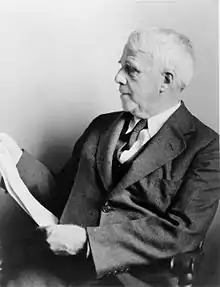

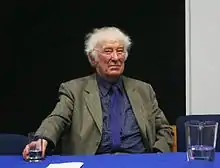
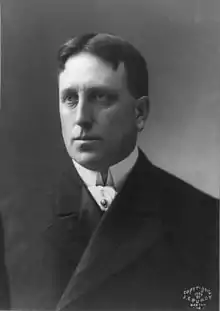
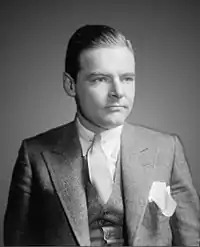


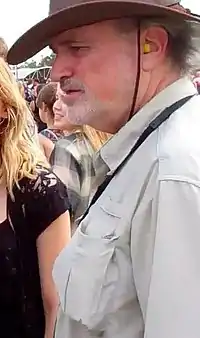

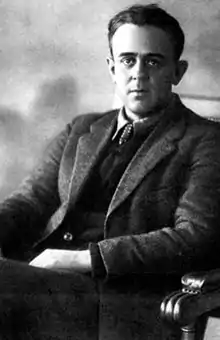


.jpg.webp)




.jpg.webp)
